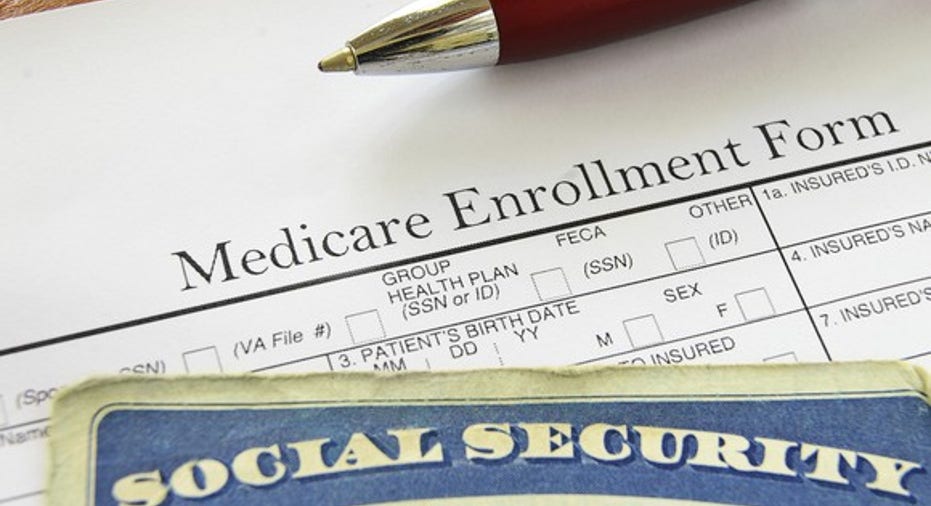Do I Get Medicare When I Turn 65?

Sixty-five is the eligibility age for Medicare, and the process of enrollment depends on a few factors -- specifically, whether you're collecting Social Security yet and if you have health coverage through an employer. Some people are enrolled automatically when they turn 65, while others will need to apply.
Who is automatically enrolled for Medicare and who needs to sign up?
Some people will be automatically enrolled in Medicare Part A, which is hospital insurance, and Part B, which is medical insurance, if they meet certain criteria:
- If you're already getting Social Security benefits or are receiving retirement benefits from the Railroad Retirement Board (RRB), you'll automatically get Part A and Part B on the first day of the month you'll turn 65. (Note: If you live in Puerto Rico, Part A is automatic. If you want Part B, you'll need to sign up.)
- If you've gotten Social Security or RRB disability benefits for 24 months, you'll automatically get Part A and Part B.
- If you have ALS (Lou Gehrig's disease), you'll get Part A and Part B the month your disability benefits begin.
If you're automatically enrolled, you can expect to get your Medicare card in the mail three months before you'll be eligible for benefits. On the other hand, if you're 65 and are not yet receiving Social Security or RRB benefits or if you qualify for Medicare because you have end-stage renal disease, you'll need to sign up.
When and how to sign up for Medicare
If you aren't automatically enrolled, you'll have a seven-month initial enrollment period when you become eligible for Medicare. For those who are eligible based on age, this period includes the three months before the month you turn 65, the month you turn 65, and the next three months.
You can choose to sign up for Medicare Parts A and/or B during or after your initial enrollment period, and your coverage will begin when you sign up. However, if you don't sign up during your initial enrollment period, you may have to pay a penalty (higher premiums) for enrolling late.
If you don't sign up during your initial enrollment period, you'll be able to sign up during the general enrollment period, which runs from Jan. 1-March 31 each year. Or, if you're covered under an employer's plan when initially eligible, you may be able to sign up later during a special enrollment period, in which case you won't have to pay any penalty. More on that shortly.
There are a few different options for signing up. The easiest and fastest way is to apply online at the Social Security Administration's website. According to the SSA, the application should take less than 10 minutes and there are no forms to sign and no additional documentation requirements. Or you can apply at your local Social Security office (it's wise to make an appointment first), or over the phone. If you already have Medicare Part A and only need to sign up for Part B, there is a separate application to use.
If you're covered by an employer's health insurance plan...
You may or may not need to sign up for Medicare if you already have health coverage through an employer or former employer.
If you're about to turn 65, you should ask your employer or benefits administrator if they require you to sign up for Medicare when you initially become eligible. If they don't, you can sign up later on -- the initial enrollment period and its penalties won't apply to you. If you're over 65 and still working (or if your spouse is), you don't have to sign up for Medicare until you retire or lose that coverage.
A special enrollment period lasts for eight months and begins the month after your employment ends or your health coverage based on that employment ends, whichever comes first.
It's also important to mention that if you're retired and have health insurance through a former employer or if you have COBRA, it is not considered employment-based coverage and a special enrollment period doesn't apply. Once you apply for Medicare, it becomes your primary insurance, and healthcare costs not covered by Medicare can be submitted to your other plan.
Don't miss your initial enrollment period
Finally, it's important to emphasize that you should apply for Medicare during your initial enrollment period, unless you qualify for a special enrollment period due to employer health coverage. Failing to do so can result in some pretty still penalties.
Most people don't pay a premium for Medicare Part A, so they don't have to worry about a penalty. However, for Part B, your monthly premium can go up by 10% for each full 12-month period that you could have had Part B but didn't sign up. So, if you wait 27 months after your initial enrollment period ends to sign up for Part B, two full 12-month periods will have passed, and your premium goes up by 20%. And this penalty is permanent. You'll have to pay it as long as you have Part B.
The article Do I Get Medicare When I Turn 65? originally appeared on Fool.com.
Try any of our Foolish newsletter services free for 30 days. We Fools may not all hold the same opinions, but we all believe that considering a diverse range of insights makes us better investors. The Motley Fool has a disclosure policy.
Copyright 1995 - 2016 The Motley Fool, LLC. All rights reserved. The Motley Fool has a disclosure policy.



















